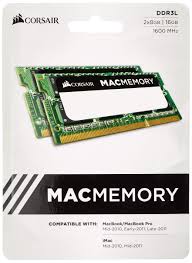The Benefits of Using 16GB RAM (2×8) in Your Computer
When it comes to upgrading your computer’s performance, one of the most effective ways is by increasing the amount of RAM. A popular configuration that many users opt for is installing 16GB of RAM in the form of two 8GB modules, commonly referred to as “16GB RAM (2×8)”.
Here are some key benefits of using 16GB RAM (2×8) in your computer:
- Improved Multitasking: With 16GB of RAM, your computer can handle multiple tasks simultaneously without slowing down. This is especially beneficial for users who frequently work with resource-intensive applications or run multiple programs at the same time.
- Enhanced Performance: More RAM allows your computer to store and access data quickly, resulting in faster loading times for applications and improved overall system performance. This can lead to a smoother and more responsive computing experience.
- Better Gaming Experience: Gamers often require a significant amount of RAM to run modern games smoothly. With 16GB of RAM, you can enjoy better frame rates, reduced loading times, and improved graphics performance in games.
- Future-Proofing: As software and applications become more demanding over time, having ample RAM ensures that your computer remains capable of handling future upgrades and advancements without the need for immediate hardware replacements.
In conclusion, investing in 16GB RAM (2×8) for your computer can significantly enhance its performance across various tasks and activities. Whether you’re a power user, gamer, or simply looking to future-proof your system, upgrading to 16GB of RAM is a wise choice that can bring noticeable improvements to your computing experience.
Top 5 FAQs About Using 16GB RAM (2×8) in Your Computer
- 1. What are the benefits of using 16GB RAM (2×8) in a computer?
- 2. Is 16GB RAM (2×8) suitable for gaming?
- 3. How does installing 16GB RAM (2×8) improve multitasking capabilities?
- 4. Are there any compatibility issues when using 16GB RAM (2×8) in certain computer systems?
- 5. What is the difference between using two 8GB modules versus a single 16GB module for RAM?
1. What are the benefits of using 16GB RAM (2×8) in a computer?
Using 16GB RAM (2×8) in a computer offers a range of benefits that can significantly enhance its performance. With this configuration, users can experience improved multitasking capabilities, allowing the computer to handle multiple tasks simultaneously without slowing down. Additionally, the enhanced performance provided by 16GB of RAM enables faster loading times for applications and smoother overall system operation. Gamers, in particular, can enjoy better gaming experiences with reduced lag and improved graphics performance. Furthermore, investing in 16GB RAM (2×8) helps future-proof the computer, ensuring it remains capable of meeting the demands of evolving software and applications without the need for immediate hardware upgrades.
2. Is 16GB RAM (2×8) suitable for gaming?
When considering whether 16GB RAM (2×8) is suitable for gaming, the answer is a resounding yes. With 16GB of RAM installed in the form of two 8GB modules, gamers can experience significant improvements in their gaming performance. The ample amount of RAM allows for smoother gameplay, faster loading times, and better multitasking capabilities while running resource-intensive games. Additionally, 16GB of RAM provides enough headroom for future game releases that may require more memory to run optimally. Overall, investing in 16GB RAM (2×8) is a great choice for gamers looking to enhance their gaming experience and ensure that their system can handle the demands of modern games effectively.
3. How does installing 16GB RAM (2×8) improve multitasking capabilities?
Installing 16GB of RAM in the form of two 8GB modules, commonly known as “16GB RAM (2×8)”, significantly enhances multitasking capabilities by providing ample memory for the system to handle multiple tasks simultaneously. With 16GB of RAM, the computer can store and access data more efficiently, allowing for smoother transitions between applications and faster response times when switching between tasks. This increased memory capacity reduces the likelihood of slowdowns or bottlenecks when running resource-intensive programs or multitasking, ultimately leading to a more seamless and productive computing experience.
4. Are there any compatibility issues when using 16GB RAM (2×8) in certain computer systems?
When considering the use of 16GB RAM (2×8) in certain computer systems, compatibility issues may arise depending on the motherboard and chipset specifications. Some older or budget-friendly systems may have limitations on the amount and type of RAM they can support, which could affect the use of 16GB RAM (2×8) modules. It is important to check the motherboard’s documentation or manufacturer’s website to ensure that it is compatible with this configuration. Additionally, some systems may require specific configurations or memory speeds to function optimally with 16GB RAM (2×8), so it is advisable to research compatibility requirements before making a purchase.
5. What is the difference between using two 8GB modules versus a single 16GB module for RAM?
When considering the choice between using two 8GB modules versus a single 16GB module for RAM, the main difference lies in how the memory is utilized by the computer. Opting for two 8GB modules allows for dual-channel memory configuration, which can potentially offer better performance compared to a single 16GB module operating in single-channel mode. Dual-channel memory enables the system to access and process data more efficiently by utilizing two memory modules simultaneously. This can result in improved multitasking capabilities and overall system responsiveness. Additionally, using two modules provides redundancy in case one module fails, allowing the system to continue functioning with reduced capacity rather than being completely disabled. Ultimately, the decision between these configurations depends on factors such as budget, performance requirements, and future upgrade considerations.
Tags: 16gb ram, 16gb ram 2x8, 2x8, benefits, computer, enhanced performance, future-proofing, gaming experience, multitasking, performance
